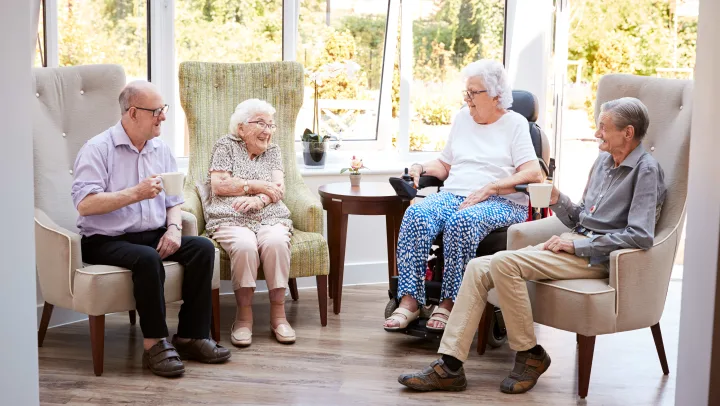The Importance of a Comprehensive Program of Treatment in Assisted Living Setups
In aided living setups, the implementation of a comprehensive program of care is essential for resolving the multifaceted needs of homeowners. By focusing on personalized care strategies and involving households in the process, these programs can substantially boost wellness end results and top quality of life.
Comprehending Comprehensive Treatment Programs
As helped living centers proceed to progress, understanding comprehensive treatment programs becomes essential for both residents and their families. Comprehensive treatment programs are created to resolve a variety of requirements for people residing in aided living environments, making sure that each resident gets tailored assistance that reflects their special health and wellness conditions and way of life choices.

Households play an essential role in this procedure, participating in treatment preparation and ongoing discussions to make certain that the resident's demands are constantly met. Understanding these programs is essential for making informed decisions regarding care alternatives and maximizing the high quality of life for citizens in assisted living centers.
Benefits for Homeowners

(Dementia Care Charlotte)One key advantage of detailed care is the enhancement in health end results. Normal tracking and coordinated healthcare help in the very early detection and management of chronic problems, reducing hospitalizations and emergency treatments. Residents profit from improved social engagement, as organized activities and programs promote a sense of area, dealing with feelings of isolation and loneliness.
In addition, homeowners experience enhanced satisfaction, recognizing that expert assistance is readily offered should they call for assistance. This guarantee permits them to focus on enjoying their day-to-day tasks and maintaining significant relationships.
Function of Caretakers
Caregivers play a pivotal function in the health of locals in assisted living centers, guaranteeing that their demands are consulted with concern and experience. They act as the key point of contact for residents, giving crucial support in daily tasks such as showering, dressing, and medicine management. Their visibility not just promotes physical wellness but also boosts emotional and social health by fostering partnerships developed on trust fund and understanding.
In addition to sustaining daily living tasks, caretakers contribute in keeping an eye on changes in citizens' wellness and actions. They are educated to acknowledge subtle indications of distress or decline, enabling prompt treatments that can stop difficulties. Their knowledge of each resident's special history and choices enables them to supply personalized treatment, boosting the overall quality of life.
Additionally, caretakers act as advocates for homeowners, communicating their demands and choices to various other medical care experts and household members. This advocacy is important in developing an alternative care setting that respects the self-respect and freedom of each individual. Inevitably, the dedication and skill of caregivers are vital components of a comprehensive program of care, underpinning the success of assisted living settings.
Customizing Care Program
While every resident in assisted living has special needs and preferences, tailoring care strategies is necessary to delivering efficient and customized assistance. A one-size-fits-all method to care can overlook vital aspects of private wellness, potentially resulting in suboptimal results. Memory Care. A comprehensive analysis of each local's health and wellness standing, individual background, and way of living choices is paramount in establishing tailored care methods.
The customization procedure includes partnership amongst medical care specialists, caregivers, and family members. By integrating input from all stakeholders, care strategies can address not just clinical requirements however also emotional and social elements that add to general top quality of life. Normal evaluations and updates to these plans ensure that they stay pertinent as residents' conditions and choices evolve over time.
(Dementia Care Charlotte)Additionally, customized treatment strategies advertise a sense of self-respect and autonomy among homeowners, fostering an atmosphere where they really feel valued and appreciated. This tailored approach not only boosts the effectiveness of care yet likewise reinforces the relationship between caregivers and citizens, developing a helpful community atmosphere. Inevitably, investing in personalized treatment preparation is a keystone of supplying top quality assisted living solutions that meet the varied requirements of citizens.
Enhancing Neighborhood Involvement
Building on the foundation of tailored care strategies, boosting community engagement is a vital element of improving the overall experience for locals in assisted living (Assisted Living). Energetic engagement in area tasks cultivates social connections, combats sensations of seclusion, and contributes to emotional wellness. Helping with opportunities for citizens to take part in group tasks, such as art classes, gardening, and workout sessions, develops a comprehensive environment that advertises communication and cooperation
Furthermore, integrating locals into the broader neighborhood via partnerships with regional companies can offer improving experiences, such as offering and going to cultural events. This not just aids residents feel valued yet likewise reinforces ties with the bordering community, enhancing their feeling of belonging.
Moreover, encouraging family members involvement in neighborhood activities is necessary. Memory Care. Member of the family can act as crucial support group, read the full info here helping to bridge the space between homeowners and the neighborhood. Regular family occasions and open forums for discussion foster openness and cooperation, making sure that the care environment remains receptive to the needs of all stakeholders
Conclusion
Finally, detailed care programs in assisted living settings play a critical function in optimizing residents' health. By attending to medical, emotional, and social requirements, these programs not only improve lifestyle yet additionally promote early detection of wellness problems, decreasing the possibility of hospitalizations. Moreover, the participation of family members in care planning strengthens support networks, cultivating a dignified and autonomous living environment. Inevitably, such programs contribute dramatically to the overall health and wellness outcomes and complete satisfaction of locals.